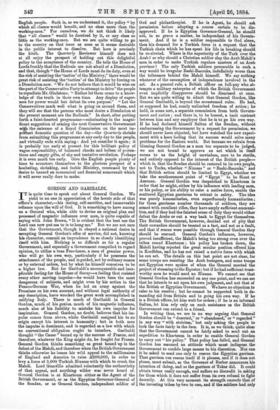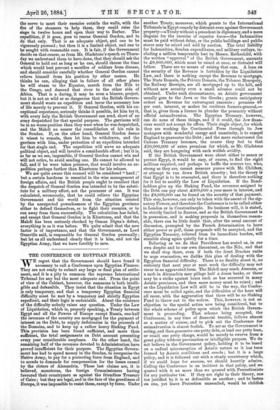GORDON AND GARIBALDI.
IT is quite time to speak out about General Gordon. We yield to no one in appreciation of the heroic aide of that officer's character,—his daring, self-sacrifice, and immoveable reliance upon the will of God. It is something to have among us. a General who, while able to devise an original plan and possessed of magnetic influence over men, is quite capable of saying with John Brown, "It is evident that the best use the Lord can now put me to is to hang me." But we are not sure that the Government, though it obeyed a national desire in accepting General Gordon's offer of service, did not, knowing his character, commit an imprudence in so closely identifying itself with him. Nothing is so difficult as for a regular Government, and especially a Government compelled to regard opinion, to utilise a true Free-lance, a man of genuine power, who will go his own way, particularly if he possesses the attachment of the people, and is guided, not by ordinary reason or by external orders, but by what he himself conceives to be a higher law. But for Garibaldi's unconquerable and inex- plicable feeling for the House of Savoy—a feeling that resisted every other moving impulse—he would have been the most dangerous of subjects, and might even by his action in the Franco-German War, when he led an army against the Prussians on his own account, and without legal authority of any description, have wrecked the great work accomplished in unifying Italy. There is much of Garibaldi in General Gordon, much of his genius, much of his magnetic influence, much also of his liability to mistake his own impulse for inspiration. General Gordon, no doubt, believes that his im- pulse comes from above, while Garibaldi assigned his to no origin except his interest in humanity ; but in both men the impulse is dominant, and is regarded as a law with which no conventional obligation ought to interfere. Garibaldi thought " the Cause " bound up in the success of France, and therefore, whatever the King might do, he fought for France. General Gordon thinks something as great bound up in the defeat of the Mandi, and therefore when the British Government thinks otherwise he issues his wild appeal to the millionaires of England and America to raise £200,000, in order to levy a force of 3,000 Turkish Nizams with which to crush the Mandi. Lord Granville admitted reluctantly the authenticity of that appeal, and anything wilder was never heard of. General Gordon is at Khartoum either as the Agent of the British Government, or as the Egyptian Governor-General of the Soudan, or as General Gordon, independent soldier of God and philanthropist. If he is Agent, he should ask permission before adopting a course certain to be dis- approved. If he is Egyptian Governor-General, he should not, in so grave a matter, be independent of his Govern- ment. And if he is a soldier responsible to God alone, then his demand for a Turkish force is a request that the Turkish chain which he has spent his life in breaking should be re-riveted. Where is the superiority of the Turk over the Arab ? or why should a Christian soldier slay the Arab Mandi's men in order to make Turkish regulars masters of an Arab province ? The only Turkish soldiers procurable in such a way would be irregular Bashi-Bazouks, indefinitely worse than the tribesmen behind the Mandi himself. We say nothing whatever of the assumption of independence involved in the act. As a general rule, a British officer on full-pay who at- tempts a military enterprise of which the British Government even implicitly disapproves should be dismissed at once. But we are quite willing to admit that General Gordon, like General Garibaldi, is beyond the accustomed rules. He had, or supposed he had, nearly unlimited freedom of action ; he held, in some sort, a separate commission from both Govern- ment and nation • and there is, to be honest, a tacit contract between him and any employer that he is to go his own way. If he had declared himself Sultan of the Soudan, without embarrassing the Government by a request for permission, we should never have objected, but have watched the new experi- ment with a keen feeling that its success would solve many problems for the Eastern world. But because we refrain from blaming General Gordon as a man too separate to be judged, we are not bound to approve an act which in itself seems to us the height of unwisdom, sure to be sterile, and entirely opposed to the interest of the British people— which is, that the Soudan should be restored to its own people, not to Turks, whether "Nizams " or " Bashi-Bazouks," and that British action should be limited to Egypt, whether we take the southernmost point of " Egypt " to be Siout or Assouan. General Gordon was despatched to Khartoum in order that he might, either by his influence with leading men, or his policy, or his ability to raise a native force, enable the scattered Egyptian garrisons to retreat in safety. The idea was purely humanitarian, even superfluously humanitarian ; for these garrisons number thousands of soldiers, they are armed with excellent rifles, they have amply sufficient ammuni- tion, and if they had the faintest sense of duty they would either defeat the Arabs or cut a way back to Egypt for themselves. The British Government, however, decided out of pity that their cowardice should be treated as a fact, and not as a fault, and that if rescue were possible through General Gordon they should be rescued. General Gordon's influence, however, proved insufficient, the Mandi's being too strong even over the tribes round Khartoum ; his policy has broken down, the Mandi having rejected the great secular position offered him in Kordbfan, and he has not raised a native force with which he can act. The details on this last point are not clear, for some troops are resisting the Arab besiegers, and some troops not Egyptian were spoken of when the General mooted the project of steaming to the Equator; but if he had sufficient trust- worthy men he would need no Nizams. We cannot see that General Gordon has succeeded on any one point, and we can see that he intends to act upon his own judgment, and not that of the British or Egyptian Government. We have no objection to raise to his resolve ; but he-cannot be supported both in de- manding aid from Britain and in going his own way. If he is a British officer, let him wait for orders ; if he is an informal Sultan, let him rely only on such assistance as the British Government can extend to a friend.
In writing thus, we are in no way arguing that General Gordon should be " deserted," or " abandoned," or " regarded " in any way " with stoicism," but only asking the people to look the facts fairly in the face. It is, as we think, quite clear that the Government cannot be fairly asked to send out an expedition to Khartoum in order to enable General Gordon to carry out " his policy." That policy has failed, and General. Gordon has assumed an attitude which must indispose the Government to confide large means to his discretion. Nor can it be asked to send one only to rescue the Egyptian garrison. That garrison can rescue itself if it pleases, and if it does not please, must submit, as the Governor of Berber announces his intention of doing, and as the garrison of Tokar did. It could obtain terms easily enough, and suffers no discredit in asking for them which it does not suffer from its own refusal to fight decently. At this very moment its strength exceeds that of the investing tribes by two to one, and if the soldiers had only
the nerve to meet their enemies outside the walls, with the fire of the steamers to help them, they could raise the siege in twelve hours and open their way to Berber. The expedition, if it goes, goes to rescue General Gordon, and to do that only. That is an adequate object, and one to be vigorously pursued ; but then it is a limited object, and one to be sought with reasonable care. It is fair, if the Government decide on that course, as from Mr. Gladstone's speech on Thurs- day we understand them to have done, that they should ask the General to hold out as long as he can, should choose the time which would best prevent a sacrifice of soldiers from disease, and should consider carefully whether General Gordon cannot relieve himself from his position by other means. He thinks he can, alleging that in failure of all other plans he will steam to the Equator, march from the Nile to the Congo, and descend that river to the other side of Africa. That is a daring, it may be even a bizarre, project, but it is not so wild or so dangerous that the British Govern- ment should waste an expedition and incur the necessary loss of life merely to prevent it. If General Gordon, with his ex- ceptional experience, seriously thinks it possible, let him try it, with every help the British Government can send, short of an army despatched for that special purpose. The garrisons will be in no worse position than they were when he was despatched, and the Mandi no nearer the consolidation of his rule in the Soudan. If, on the other hand, General Gordon deems it wisest to remain, then let him be withdrawn, and the garrison with him, under protection of an expedition intended for that single end. The expedition will serve no adequate political object, and will involve a considerable effort ; but it is, as far as we see, impossible, if General Gordon cannot win and will not retire, to avoid sending one. He cannot be allowed to fall, and if he were taken prisoner, that would involve an ex- pedition perhaps further than Khartoum for his release.
We are quite aware this counsel will be considered " hard ;" but a certain hardness is essential to the wise management of foreign affairs, and the British people ought to recollect that the despatch Of General Gordon was intended to be the substi- tute for a military effort, not the precursor of one. It was culculated, erroneously, that he could relieve the Egyptian Government and the world from the situation created by the unexpected powerlessness of the Egyptian garrisons either to defend themselves, or to fight their enemies, or to ran away from them successfully. The calculation has failed, and except that General Gordon is in Khartoum, and that the Mandi has been seriously checked by Osman Digna's defeat, everything is as it was before. We quite admit that the new factor is of importance, and that the Government, as Lord Granville said, is responsible for General Gordon personally ; but let us all understand clearly that it is him, and not the Egyptian Army, that we have forcibly to save.



































 Previous page
Previous page